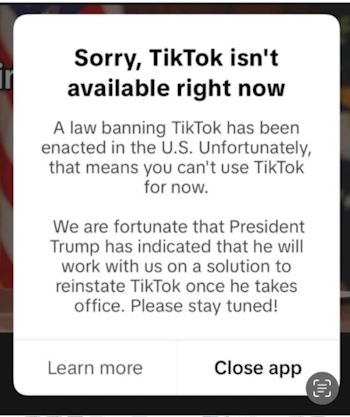Generative AI is a transformative branch of artificial intelligence that can create original content, including text, images, audio, and even video. Unlike traditional AI systems, which rely on pre-programmed rules or data analysis, generative AI uses advanced machine learning models like Generative...
TikTok in the Crosshairs: What the Ban Means for Users, Creators, and Businesses
Overview
TikTok has transformed from a simple social media app into a cultural and economic powerhouse, but its future remains uncertain amidst ongoing debates over security and regulation.

TikTok was once a term we used to mimic the sound of a clock ticking. Now, it is synonymous with a powerful social media platform. This app has revolutionized content creation, bringing trends, challenges, and viral moments to the forefront of popular culture.
TikTok is not your ordinary social media app. With over 150 million users in the U.S. alone (yes, nearly half the country), TikTok has embedded itself in the daily lives of people across all age groups. Although the platform is most popular among Gen Zers, millennials and even older generations are joining the TikTok wave.
For digital marketers, this user base translates to immense opportunities for brand reach and engagement. From dance trends to viral challenges, TikTok's influence on culture, shopping behaviors, and digital media is unprecedented.
Why Did TikTok Recently Go Black?
If you’re an avid TikTok user, you may have noticed unsettling interruptions in the app recently — brief periods of “blackout.” Why did this happen? The answer lies in the growing scrutiny TikTok faces from American lawmakers over its ties to China. TikTok's parent company, ByteDance, is headquartered in Beijing, raising concerns over data gathering and potential misuse of user information.
The recent outages resulted from mounting political pressure and technical disruptions as talks of a potential ban escalated. During questioning in a Congressional hearing, TikTok’s CEO, Shou Zi Chew, defended the platform, addressing concerns about data privacy and promising transparency. Yet, the tension seems far from resolved.
How TikTok Affects the Economy
Beyond viral videos and catchy audios, TikTok’s economic clout is undeniable. Here's how the platform drives growth across industries:
- Boosting Small Businesses
TikTok’s algorithm does what few platforms can—it evens the playing field. Small businesses can go viral overnight. Whether it’s a local boutique or an artisan candle maker, TikTok’s reach helps businesses attract customers globally without hefty ad budgets. - Creator Economy Explosion
TikTok has birthed an entirely new profession—full-time TikTok creators. Influencers partner with brands, sell merchandise, and monetize live streams. For many, TikTok isn’t just an app; it’s their livelihood. TikTok influencers' earnings can vary widely based on their follower count, engagement rate, and the type of content they produce. According to a recent report, influencers can potentially bring in between $0.02 and $0.04 for every 1,000 views. That translates to $20,000-$40,000 for those reaching one million views. - Advertising Revenue
With its massive user base, TikTok is a goldmine for digital advertising. Major brands across industries invest in TikTok campaigns to connect with younger, engaged audiences. From Coca-Cola to Target to Shein to Nike, companies earmark large portions of their advertising budgets for TikTok content.
Why Is TikTok Facing a Potential Ban?
The push to ban TikTok in the U.S. stems primarily from concerns over:
- Data Security and Privacy
At the heart of the issue are allegations that TikTok may share user data with the Chinese government. Critics argue that ByteDance’s potential compliance with Chinese surveillance laws poses a security risk to U.S. citizens. - Political Influence
There’s growing fear that TikTok could be used to spread misinformation. Given the reach and persuasive nature of the platform, this concern carries significant weight. - Youth Mental Health
Lawmakers have also criticized platforms like TikTok for their effects on mental health, particularly among teens. While this issue isn’t exclusive to TikTok, its addictive nature has drawn criticism from educators, parents, and many mental health advocacy groups. - Economic Sanctions and Tensions
The U.S.-China trade war has strained relations between the two global superpowers. TikTok has unintentionally become a nexus for broader geopolitical tensions, making it a political lightning rod.
Numerous states in the U.S. have already banned the use of TikTok on government-issued devices. But a full nationwide ban would fundamentally alter the way millions of people interact online.
What Does the Future Hold for TikTok?
The question remains—what’s next for TikTok? While it’s impossible to predict the outcome with certainty, we can explore some potential scenarios.
- A Forced Reorganization or Sale
Lawmakers in the U.S. may push for TikTok’s separation from ByteDance. If ByteDance agrees to sell TikTok to an American company, it could resolve many data-related concerns. - Increased Regulation
TikTok could implement stricter data-handling practices, perhaps under U.S. regulatory scrutiny. A “Project Texas” initiative is already in the works, aiming to store U.S. data locally to ease security concerns. - A Full Ban
Although extreme, the possibility of an outright ban remains. This move would likely face immense backlash from users, creators, and businesses—all of whom benefit significantly from TikTok’s ecosystem. - Evolving Competition
While TikTok navigates legal hurdles, competitors like Instagram Reels, YouTube Shorts, and Snapchat Spotlight are ramping up their efforts to capture similar audiences. The gap left by a TikTok ban could reshape the social media landscape. - Global Influence and Accountability
TikTok has committed to transparency and collaboration with governments worldwide. If these efforts prove authentic, the platform could emerge from this crisis as a stronger and more reputable entity.
What Can You Do as a User or Business?
Whether you’re a social media user, creator, or marketer, it’s essential to prepare for any potential disruption TikTok may face. Consider:
- Diversifying your social media presence. Don’t rely on TikTok alone—explore other platforms like Facebook, Instagram, YouTube, or LinkedIn.
- Backing up your content library. Secure copies of your videos and analytics in case of unexpected changes.
It’s Not Over Yet
TikTok finds itself at a crossroads, caught between innovation and regulation, freedom and oversight. Regardless of what happens next, it has already fundamentally changed how we create, share, and consume content online.
The outcome of this ongoing debate will shape not only the future of TikTok but also the broader digital media system.
Stay tuned—and yes, keep scrolling (responsibly).
Intrada Technologies at Web Summit 2024
This past November, Eric Greco and Adam Post of Intrada Technologies attended the Web Summit in Lisbon, Portugal. Held across the MEO Arena and the Lisbon Exhibition & Congress Centre, the event brought together nearly 72,000 attendees from 160 countries. Web Summit 2024 was a massive melting po...


